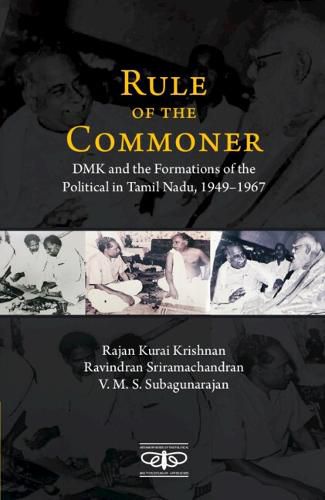Readings Newsletter
Become a Readings Member to make your shopping experience even easier.
Sign in or sign up for free!
You’re not far away from qualifying for FREE standard shipping within Australia
You’ve qualified for FREE standard shipping within Australia
The cart is loading…






The Dravida Munnetra Kazhagam (DMK) has been singular in heralding and establishing a firm regional polity among the Indian states after the Indian Union was inaugurated as a republic. Academic scholarship has often treated the DMK as a Tamil nationalist or ethno-nationalist formation without conceptual clarity or critical insight. Rule of the Commoner demonstrates with persuasive evidence that the DMK appealed to a federalist and not nationalist imagination. The DMK’s combining of the non-Brahmin Dravidian identity and allegiance to Tamil language led to a counter hegemonic formation of the plebes and left populism. Drawing on Ernesto Laclau, the book argues that the DMK achieved the construction of a people as Dravidian-Tamil, with Tamil being the empty signifier of the social whole, Brahmin vs. non-Brahmin divide functioning as the internal frontier leading to the formations of the political. It elaborates the conceptual scheme under the three rubrics of Ideation, Imagination and Mobilization.
$9.00 standard shipping within Australia
FREE standard shipping within Australia for orders over $100.00
Express & International shipping calculated at checkout
The Dravida Munnetra Kazhagam (DMK) has been singular in heralding and establishing a firm regional polity among the Indian states after the Indian Union was inaugurated as a republic. Academic scholarship has often treated the DMK as a Tamil nationalist or ethno-nationalist formation without conceptual clarity or critical insight. Rule of the Commoner demonstrates with persuasive evidence that the DMK appealed to a federalist and not nationalist imagination. The DMK’s combining of the non-Brahmin Dravidian identity and allegiance to Tamil language led to a counter hegemonic formation of the plebes and left populism. Drawing on Ernesto Laclau, the book argues that the DMK achieved the construction of a people as Dravidian-Tamil, with Tamil being the empty signifier of the social whole, Brahmin vs. non-Brahmin divide functioning as the internal frontier leading to the formations of the political. It elaborates the conceptual scheme under the three rubrics of Ideation, Imagination and Mobilization.